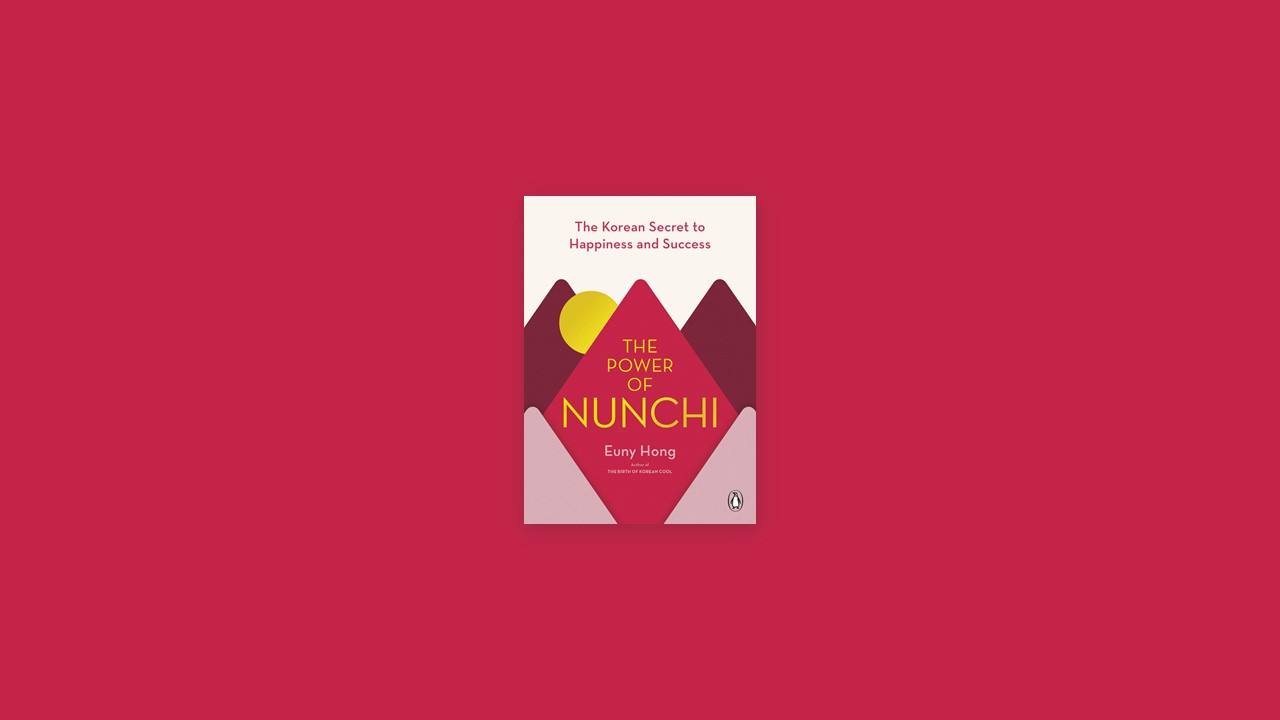What Is Nunchi?
Let’s imagine you have just started a new job at a big company, and you’re invited to a party where you want to make a great impression. When you walk into the room, everyone is laughing a bit too hard at the not-particularly-funny joke of an older woman you’ve never seen before. Do you:
- A) Step in with a really funny joke, definitely much better than the one you just heard. Your new colleagues are going to love this!
- B) Laugh along with the others, even though it’s not very amusing.
- C) Find a tactful moment to introduce yourself to the older woman, who you’ve correctly assumed must be the head of the company.
If you chose A, you seriously need to work on your nunchi. If you chose B, good work, you read the room correctly and picked up the right cues from your new colleagues. If you chose C, congratulations, you’re already on your way to mastering the power of nunchi.
Nunchi is the Korean superpower. Some people even go so far as to say it’s how Korean people can read minds—though there’s nothing supernatural about it. Nunchi is the art of instantly understanding what people are thinking and feeling, in order to improve your relationships in life. Having great nunchi means continuously recalibrating your assumptions based on any new word, gesture, or facial expression, so that you are always present and aware. Speed is paramount to nunchi; in fact, if someone is highly skilled at nunchi, Koreans don’t say they have “good” nunchi, they say they have “quick” nunchi.
Everyone is born with the potential for nunchi, but in order to draw it out, you have to challenge some of the received wisdom that has been thrown at you since birth. The author calls these cultural traits “nunchi blockers.”
The Five Blockers of Nunchi
Nunchi blocker 1: Empathy is valued over understanding
If you are in someone’s shoes, you are compromising your own ability to see their problem—and the overall situation—objectively. To paraphrase a famous observation by the nineteenth-century French writer Guy de Maupassant, the Eiffel Tower is the only place in Paris where Paris is unrecognizable. When you are “embodying” someone, it’s impossible to really see them objectively because you are far too close.
A real nunchi ninja can pick up another person’s feelings whether they can “relate” to the person or not. Using your nunchi means that you can grasp what is happening even if you don’t have anything in common with the other person—even if you don’t speak the same language.
Nunchi blocker 2: Noise is valued over stillness and quiet
Nunchi is impossible for those with no ability to quiet their mind. The importance of silencing your thoughts may make more sense if you understand that nunchi isn’t 100 percent cultural—it’s largely biological. Nunchi is a way of honoring your five senses, your gut (which many modern gurus call the “second brain”), and your wiser, older, instinctive brain.
Nunchi blocker 3: Extroversion is valued over introversion
Extroverts are for some reason considered healthy and happy, while introverts are considered to be antisocial and dark. When one person in a long-term couple is an extrovert and the other is an introvert, they can often get into the same fight over and over at social gatherings: “Why are you off in the corner when our friends are here?” In most cases, the couple’s friends will side with the extrovert and drag the quiet one to the center of attention to “pull their weight” socially.
The extroverts in this situation should examine their assumptions: why are you sure the introvert is not contributing to the room’s atmosphere? If the introvert’s distance makes you uncomfortable, why do you assume it’s their fault and not yours? Can’t you just pretend you’re all in a nineteenth-century drawing room and everyone is there because it’s the warmest room in the house, and you’re all free to embroider, sleep, play whist, or whatever you want?
Nunchi blocker 4: Jagged edges are valued over roundness
Western society tends to reward pushy behavior. It makes sense: sharp-elbowed people are trying to get your attention, so of course we notice them more. But sharp elbows create jagged edges, which leads to two results: first, those edges may cut people, whether you wanted to or not; and second, you’re giving other people an edge—a handle—to grab hold of, and they may not let go. Stay round, and your interactions with others will be smooth and easy.
You don’t have to alter your behavior radically. Roundness is more a matter of being than doing.
How can you “be round”? The next time you find yourself in a conflict, don’t just say whatever comes to mind. First, take a deep breath and ask yourself two simple questions before you think or act: “What am I doing and why?”
Nunchi blocker 5: Individualism is valued over collectivism
In Korea, if a child is impatient—for example, if they are waiting in a long line at the buffet table and complain, “We’ve been waiting forever! I’m hungry!”—the parent will not say, “Oh, you poor thing! I have grapes in my purse and they’re already sliced in halves.” They will say, “Are you the only person in the world?” (Seh-sang eh nuh man isso.) It’s a very common parental chastisement. In other words, “Yeah, kid, everyone in this line is hungry, which you’d realize if you had any nunchi.” Or to put it another way: “It’s not all about you!” It’s a hugely important part of a Korean upbringing, and a crucial concept in nunchi.
The Eight Rules of Nunchi
Rule #1: First, empty your mind
When your mind is full of assumptions about people and situations, it is hard to see what is right in front of you, and to behave in the most appropriate manner
Emptying your mind can mean anything from taking two minutes to close your eyes and focus on your breath before you enter a space, to just mentally reminding yourself to “stay in the room” when you feel your thoughts beginning to spiral.
Rule #2: Be aware of the Nunchi
There is a concept in quantum physics called the Observer Effect, which states that you change things just by the act of observing them. It’s the same when a person enters a room: you change the atmosphere just by being there, so there’s no need to make a big song and dance as you arrive.
A nunchi expert will tell you that instead of trying to make a splash when you enter a room, you should first honor the room, which will help remind you of Nunchi Rule #1: Empty your mind.
Rule #3: If you just arrived in the room, remember that everyone else has been there longer than you
Having quick nunchi means being able to eye-assess what is happening in the room as you arrive, and continuing to recalibrate your assessment continuously, as things change. Social situations can be incredibly fluid—even at a funeral there are moments of humor, and people can be very grateful for them—so be aware and be adaptable to what is actually happening, rather than to what you think should be happening.
No one is suggesting that you should feel pressured into doing something that you know to be wrong, just because everyone else is doing it. It is not nunchi-ful to join in with bullying or harassment or other antisocial behaviors, if that is what is happening in the room.
Rule #4: Never pass up a good opportunity to shut up
Anyone skilled at negotiation will tell you that being silent puts you in a highly advantageous position. The only reason we don’t hear more about silence is that quiet people by definition do not go on about how great it is to be quiet. They are unlikely to say, “I can see my silence is making you give more information, which is my whole objective.” Nunchi is the better part of valor. Negotiation is the introvert’s chance to show who’s boss.
Imagine you have fallen in love with a house and are desperate to buy it. Obviously, you want the lowest price, while the seller and agent will want the highest price.
The agent asks whether you have kids. If you’re a nunchi ninja, you may have already inferred that the agent is planning to tell you that the house is expensive because it’s in a great area for schools. Or maybe you don’t know where the question is going, but even your low-level nunchi reminds you to say as little as possible. Pause for five seconds—even though this will seem like an eternity—and say simply, “Why do you ask?”
Even if the agent has no agenda and is just being nosy, your verbal minimalism is still strategically a good idea. If you have made them nervous, that sets the tone that you are in a position of strength for the rest of the negotiation.
Be the strong and silent type. The loudest person in a negotiation is not always the winner. Leave silence and space to allow people to come to you.
Rule #5: Manners exist for a reason
Manners serve a couple of useful purposes. The very artifice of manners makes the room a safe space, just like rules in sports. It might be annoying to have to wait for everyone to be seated, or eat your soup without splashing it, but in doing so, you remind yourself to consider the comfort of others. This brings a feeling of instant calm and stability to the room and everyone in it.
Manners create a playing field for the guests. That field might not be a level one, but it is an invitation to coexist in this space and create healthy boundaries.
Rule #6: Read between the lines
It means: don’t take a person’s words as being an exact reflection of their thoughts. Study the context, study nonverbal cues. In other words, don’t judge a book by its cover. Often people’s words are just that—a cover.
You might think that everyone owes it to you to say exactly what they’re thinking, but they don’t. Koreans would consider this an entitled attitude on your part. Sometimes you do have to be a mind reader and, with good nunchi, it’s not as hard as you might imagine.
Any time you find yourself thinking, “Jeez, I’m not a psychic,” take it as a signal to yourself that your nunchi may be deficient in some way.
Rule #7: If you cause harm unintentionally, it’s sometimes as bad as if you’d caused it intentionally
Pro tip: asking others if they’ve lost weight is pretty much always terrible nunchi. They may have lost weight because of stress or illness or bereavement, and it’s inappropriate to draw attention to it. If you must comment, a simple “You look great” is rarely taken as anything other than a compliment.
Just as ignorance of the law is no excuse to a judge, a lack of awareness is no excuse to the nunchi master. Without it you cannot be said to have good nunchi.
One benefit of improving your nunchi is that you will notice far fewer occasions where you accidentally offend a person.
Rule #8: Be nimble, be quick
Koreans don’t say that person has “good nunchi,” they say the person has “quick nunchi.” The expression “slow and steady wins the race” does not apply to nunchi. Being right is sometimes useless if you’re too slow.


